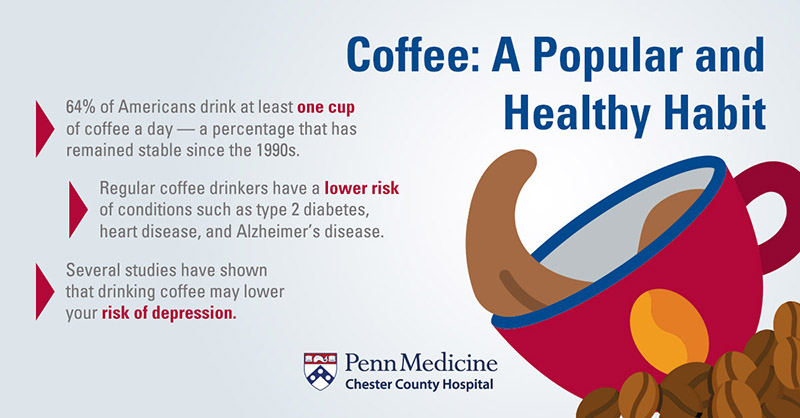It's the month of August - when summer begins to wind down, schools start back up, and, apparently, Americans celebrate National Coffee Month. Whether this holiday is rooted in deep, historical origins or just completely made up, it's a full month of coffee companies leveraging coffee deals and trying to ignite your passion for the hot (or iced), caffeinated beverage.
It's also a great time to consider the health benefits and drawbacks of drinking coffee. Whether it’s in the morning, in the afternoon, or both, many Americans cherish their cup of joe, which actually comes with plenty of health benefits.

While coffee is often a healthy option, it also may come with risks - especially if you have certain health conditions. Here's a look at your favorite steaming beverage and how you can make sure you're drinking it safely.
How Coffee Can Provide a Welcome Health Boost
"But first, coffee" - this slogan is displayed on mugs, kitchen signs, and even t-shirts across the nation, a sure sign of the love people have for their daily cup. Whether it';s the bittersweet taste, nutty aroma, or just the jolt of caffeine, it's certainly a drink that many have come to rely on.
Fortunately, beyond helping you adjust to the morning light, there are also health benefits to drinking coffee, such as:
- Giving you energy, which can sharpen your mental focus, boost your mood, and improve your performance during exercise
- Boosting your metabolism, which may lower your risk of Type 2 Diabetes
- Keeping your blood vessels strong and healthy, which may reduce your risk of stroke
- Providing antioxidants, which may lower your chances of developing cancer
- Reducing inflammation, which may help prevent Alzheimer's disease and other forms of dementia
- Providing you with small amounts of nutrients, such as potassium, niacin, and magnesium
Plus, coffee is the perfect way to incorporate fat-free or low-fat milk into your diet, increasing your calcium and vitamin D intake - both of which are essential to keeping your bones strong and healthy.
Are There Any Downsides to Drinking Coffee?
The benefits of drinking coffee are vast, but there are some drawbacks to be mindful of - especially if you-re prone to drinking fancy, sweetened versions or multiple cups a day.
If you dress up your coffee with loads of sugar, you may end up negating its benefits. Adding too much sugar to your coffee or opting for sugary beverages like lattes or blended coffee drinks can lead to weight gain and, eventually, cardiovascular risks.
Also, as with anything you put in your body, moderation is key, and too much caffeine can be harmful. The US Food and Drug Administration (FDA) recommends limiting your caffeine intake to 400 milligrams a day - or about 4 to 5 cups of coffee. Problems that may result in high levels of caffeine consumption include:
- Difficulty sleeping
- Upset stomach
- Restlessness
- Anxiety or nervousness
- Muscle tremors (also known as "jitters")
- Increased heart
Caffeine can also be addictive - in fact, 26% of coffee drinkers consider themselves addicted to the drink. If you're used to 3 cups a day and suddenly eliminate it from your diet completely, you may experience withdrawal symptoms, such as harsh headaches.
Who Should Limit or Avoid Caffeine?
There are some individuals who may be more prone to the negative side effects of caffeine. As a result, you should check with your healthcare provider about whether you should limit or completely avoid coffee if you:
- Are pregnant or breast-feeding, since caffeine is passed to the baby
- Have a sleep disorder, such as insomnia
- Suffer from migraines or chronic headaches
- Have anxiety
- Have gastroesophageal reflux disease (GERD) or ulcers
- Have an irregular heart rhythm
- Have high blood pressure
- Take certain medications, such as stimulants, or those for asthma medicine or heart disease
Children and adolescents should also avoid drinking high amounts of caffeine, as they are more sensitive to the effects of it than adults
Know Your Body - and Your Limits
Everyone's bodies are different. The way you metabolize (or process) caffeine may not be the same as someone else, so it's important to get in sync with your body.
Take notice of how you feel after drinking coffee. If you start to feel jittery after two cups, maybe limit it to one cup a day. If you have trouble sleeping when you drink coffee after dinner, save it for the morning and early afternoon.
Keep in mind - there are plenty of factors that impact caffeine levels in coffee, such as blend type, brew method, or even where the coffee was grown. For example, if you notice the cold brew from your local coffee shop comes with more negative side effects than your drip coffee at home, you may want to stick to your own tried-and-true coffee recipe.
Anything you put in your body can impact your health. As long as you listen to your body, coffee can not only ease you into your day, but it may also provide a few health benefits with each refreshing sip.
Do you have questions about how coffee or other parts of your diet can impact your health? Call 610-738-2300 to find a primary care physician on the medical staff at Chester County Hospital.
Related Information from Chester County Hospital: